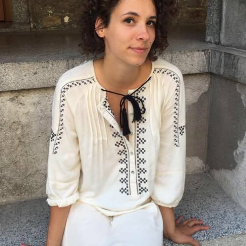You’d think that as an artist or a designer, you’d able to answer basic questions about your work and personal aspirations, but it can be a lot harder than it seems. When invited to discuss their portfolio in art school admissions interviews, some students crumble under the pressure, which is why a little preparation goes a long way. Admissions officers tend to ask variations of the same questions, and nailing your interview is sometimes just a matter of practising in front of the mirror and projecting confidence on the day. To help you prepare, we spoke to Dr Adrian Lahoud, Dean of the Royal College of Art’s School of Architecture in London about common interview questions and how to go about answering them.
Can you describe two or three important projects that you have completed?
In your answer, you should show a critical awareness of the standard of your work (aka is it any good?) and how it might sit within a wider context, i.e. its relation to the world, art theory, and other people’s work. Don’t forget to take your portfolio with you on the day because your interviewers will definitely want to see evidence of your work. If you’re not sure what to include in your portfolio, check out this Guardian piece about it.
Can you tell us what is important about these projects to you?
Even though your portfolio should speak for itself, your interview is an opportunity to explain it fully, so make the most of this chance. Peel back the layers of your work and give a sense of a technical and creative progression. How did you experiment with different materials, styles and skills? How did your interests and technique shift from project to the next - and why? What inspired you? What were you trying to achieve with each project, and were you successful?
Tell us about the trajectory of your career up to this point.
Show you are curious about the world and share any interesting experiences or interests that might reveal something interesting about you. Don’t worry too much if you feel your life has just been one boring thing after the next (most people feel that way actually). Tell the truth, but embellish it a little.
Why would you like to come to this university?
Your answer to this question needs to demonstrate an understanding of the college and the various resources it has to offer art students. You might want to mention a faculty member whose work you admire or cool facilities you’d like to take advantage of, giving a reason why (e.g. 3D modelling or animation suites, free gallery spaces etc.). Don’t forget to explain why you want to do the course: what about it appeals to you and how might it help you achieve your objectives. Your answer needs to be more involved than simply saying you want to study there because it’s the best art school in the world according to a recent QS ranking.
What do you think you could contribute to the culture of the school?
This is admittedly a tricky one. Dr Lahoud said new recruits tend to be “someone [who] can see themselves as building a collective culture, someone that can be generous and has something to contribute to the group (it doesn’t really matter what it is)”.
What is the most important/relevant/influential/recent book you have read on [insert subject]?
Dr Lahoud said: “This is intended to gauge the applicant’s appreciation of the discipline and to see how well people can think on their feet. It is usually answered very poorly.” Obviously, if you’re not a prolific reader, this might be tough to answer, but don’t paint yourself into a corner by naming a book you haven’t actually read. The interviewer is simply trying to figure out whether you actually care about your field enough to have read a few books about your field outside of the classroom. When talking about your book, show you understand the context in which it was written (i.e. why was it so pivotal at the time), but also don’t be afraid to express your own thoughts and emotions about it.
Want to improve your career prospects in art and design? Don’t miss our article on how to do this.


